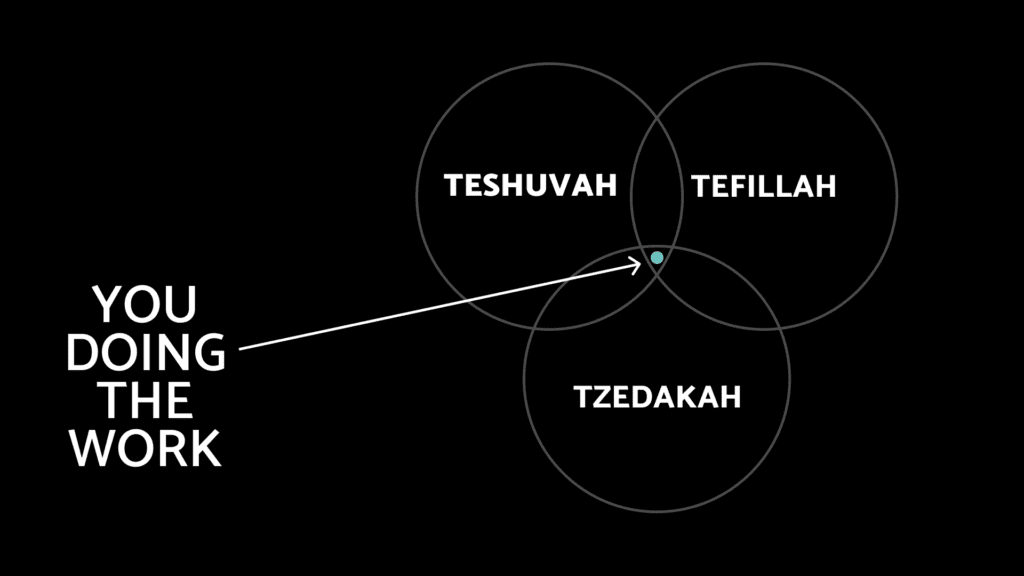Tefillah, Teshuvah, and Tzedakah

For me, every year, the day before Yom Kippur, life always feels hectic.
I’m thinking about where I’m going to eat, what I need to do for services, where I’m going to go.
Imagining that you might also be experiencing this, I want to just offer you a reminder, a nudge perhaps, about what Yom Kippur asks of us.
In Unetaneh Tokef, a core piece of liturgy for the High Holidays, we recite this:
וּתְשׁוּבָה וּתְפִלָּה וּצְדָקָה מַעֲבִירִין אֶת רֹעַ הַגְּזֵרָה
Teshuvah, Tefillah, and Tzedakah reduce the evil of the decree.
This to me is the absolute core of the entire holiday and encourages us to ask very simple but challenging questions.
Teshuvah
This word is translated often as repentance or returning. But in essence, this word is the act of asking ourselves, “how could I have been better?” This is not an easy question. It requires us to think critically about our own actions, how we might have failed to meet our highest aspirations for ourselves.
Maimonides wrote this in his halakhic compendium, the Mishneh Torah, written in the 12th century:
אֵי זוֹ הִיא תְּשׁוּבָה גְּמוּרָה
זֶה שֶׁבָּא לְיָדוֹ דָּבָר שֶׁעָבַר בּוֹ וְאֶפְשָׁר בְּיָדוֹ לַעֲשׂוֹתוֹ וּפֵרַשׁ וְלֹא עָשָׂה מִפְּנֵי הַתְּשׁוּבָה
What is complete Teshuvah?
It is when the opportunity comes to a person [to do] a thing that they did [before], as a transgression, and it is possible to do it again, and they stop and did not do that thing because of Teshuvah.
Simply, you know when you’ve done Teshuvah when you learned your lesson and you don’t do it again when the opportunity comes to do it again.
According to the Rambam then, you cannot do full Teshuvah in advance. You have to learn something, shift your thinking, do the work of asking “how could I have been better?” and then, later, complete Teshuvah is a reflection of your change.
Yom Kippur is a challenge to do the work on being better.
Tefillah
Tefillah is the word we use for prayer. It comes from the root, פלל (PLL), and is most often used in the hitpa’el form, which is reflexive. Sorry to get all grammar-y at you. But that reflexive nature of the word is the key.
We normally think about prayer as a request or expression of gratitude to God or the universe, or whatever your theology is about Divinity. But the fact that our verb for prayer is reflexive means that it is about ourselves. Meaning to say, when I pray, I’m also doing something at myself.
Therefore, what Tefillah is doing is inviting us to reflect on ourselves. “Am I the best I could be? Who am I?” These are not easy questions! How do I even know how to approach it?
The holidays are a bit of a marathon, with long days full of prayer time. That’s on purpose. During the hustle and bustle of our normal lives, we don’t always get the time to stop, breathe, and be present. The holidays are a chance to do exactly that.
If we don’t do this work, we risk allowing ourselves to become people we do not wish to be. By stopping to reflect, we can face ourselves fully and deal with the choices we’ve made and how they have made us.
Yom Kippur is a challenge to reflect on who we are and who we might want to be.
Tzedakah
This word is from the root, צדק, meaning justice. Simply, this word is about making the world a more just place. But more than that, it is about giving of who we are, our time, resources, and our capacity.
The core of it leads us to the question, “how am I making the world a better place?”
In the Talmud, on Shabbat 54b, there is a teaching about protesting the sinful conduct of those around you. It begins like this:
Anyone who is able to protest the people of their house [for their behavior] and does not protest, is responsible for their household.
It goes on to include one’s city and the world.
The principle at play, more than protest, is that we are responsible for making an impact whenever we are capable of making an impact. So, the question of, “how am I making the world a better place?” is not truly about the whole world. It is about how we take care of our families, our neighbors, our fellow residents.
Yom Kippur is a challenge to take responsibility for our personal role in making the world a better place.
So yes, Yom Kippur has a lot of pieces, prayers, fasting, and so on, all of which are important. But these three questions are the core:
How could I have been better?
Am I the best I could be?
How am I making the world a better place?